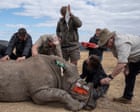
In recent days, the world has witnessed a series of significant environmental occurrences across different continents, highlighting both the remarkable forces of nature and ongoing climate challenges. From innovative conservation efforts in South Africa to severe weather events across the globe, these developments underscore our planet’s dynamic ecosystem.
South Africa is pioneering a novel anti-poaching initiative dubbed the Rhisotope Project, which sees the University of the Witwatersrand, alongside nuclear energy officials and conservationists, injecting the horns of rhinoceroses with harmless radioactive isotopes. This initiative aims to deter illegal trafficking by making the horns detectable at borders and airports. Initially applied to five rhinos, this technique holds promise for broader application, representing a groundbreaking stride in wildlife conservation.
In Asia, northern China has faced devastating floods after yet another occurrence of torrential rains, leading to tragic loss of life. At least 70 fatalities have been confirmed, with several incidents of people being swept away or caught in landslides. Over a week, Beijing and its outlying areas received rainfall that matched the region’s usual monthly totals, exacerbated by climate conditions that have seen a rise in extreme weather events globally.
Meanwhile, southern Queensland in Australia experienced an unusual snowfall, a rare sight for the region typically associated with milder winter conditions. As snow fell in Dalveen, located between Stanthorpe and Warwick, the New South Wales State Emergency Service responded to reports of about a hundred vehicles trapped in the snow. These unexpected weather conditions serve as a reminder of the planet’s unpredictability.
On another front, northern Europe’s Nordic countries are experiencing an unprecedented heatwave, with regions typically known for their colder climates reporting soaring temperatures. The heatwave marks the longest period on record since 1961 where temperatures consistently exceeded 30 degrees Celsius. This is particularly evident in areas within the Norwegian Arctic Circle and Finland, where communities have felt the intensified effects of climate change.
Furthermore, Portugal is in a state of alert due to ongoing forest fires, with efforts to contain a significant fire in Ponte da Barca making favorable progress. This period of heightened alert is intended to mitigate risks and ensure that response measures are in place to tackle any further incidents during the peak fire season.
In Indonesia, seismic activities persist as the Lewotobi Laki-Laki volcano erupted, sending volcanic ash up to 19.5 kilometers into the atmosphere. This eruption is part of the geological activity inherent to the region, affecting communities and necessitating evacuation plans to ensure public safety.
Finally, Portugal is also grappling with the impact of a heatwave that has been linked to 264 unexpected mortalities. The need for the human body to adapt to extreme temperatures poses particular risks to vulnerable groups like children and the elderly, underscoring the importance of healthcare strategies adapted to climate conditions.
These diverse events, whether driven by natural phenomena or exacerbated by human-induced climate change, highlight the intricate and interlinked challenges our world faces. As these stories unfold, they serve as poignant reminders of the need for continued vigilance, collaboration, and innovative solutions to meet the environmental and climate challenges of our time.
Source: {link}
